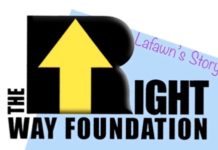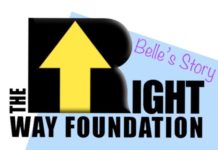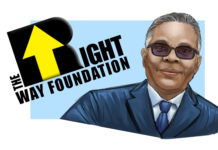A significant aspect of CRIME STORY’s mission is to draw attention to programs that have demonstrated success in helping stem the tide of over-incarceration. As part of that mission, we published The RightWay To Shut Off the Foster Care to Prison Pipeline by Sean Smith. That piece told the story of how the RightWay Foundation — based in Los Angeles — is working to address the core reasons why 25% of California’s recently emancipated foster youth are incarcerated within two years of emancipation. (This has become known as the Foster Care To Prison Pipeline.)
As a critical part of these efforts, the RightWay Foundation provides therapy for these youth to help them process their trauma and reclaim the narratives of their lives.
In Sean’s piece, CRIME STORY and the RightWay Foundation announced the launch of a unique creative collaboration. Building off of their therapy efforts, and working closely with CRIME STORY journalists, a self-selected group of RightWay youth will craft narratives about their experiences in and out of the foster care system. These accounts will be published on the CRIME STORY website periodically.
This is one of those accounts; this is Leo’s story.
I don’t really share this story with a lot of people.
In second grade I had thoughts about this boy in class. There was just something about him — maybe it was his cute bowl cut or maybe it was how he also stood up for me when I got bullied. One day I went home to my foster mom, and I told her about my thoughts. She made me walk around in heels everyday after school as punishment.
There would be nights when my foster mom would pull me off the bed at 3 am, whip me, and throw me outside with the dog. She would chase me around the house with knives. She once threw me in the shower and started flushing the toilet. It got hotter and hotter until it burnt my skin. I didn’t understand what I did wrong. At the time, I didn’t even know what “gay” meant. I just knew that what she was doing to me was wrong. And I knew it was wrong when my foster dad started molesting me.
After five years of abuse at that foster home, something inside me just broke. So I broke the windows. I guess that after three weeks of me constantly breaking glass they just got tired of me.
I was thirteen and a half when I was put in my first African American foster house. I’m Hispanic and I never expected to be taken in by another race, but from the second I walked inside I just knew that was home. My mom looked at my garbage bag full of clothes and raised her eyebrow.
“That’s all you have?” she asked.
I nodded, “That’s all I’ve had for three years. What did you expect?”
She held out her hand. “Let me see it.”
I reluctantly gave her the sack full of my belongings. She inspected the ragged clothes inside. Then she threw them away. The whole bag. I was pissed, but she just shrugged and told me to get in the car. We drove to McDonald’s, and she bought me my first Happy Meal. That made me forgive her a little bit. Then she took me to Target and bought me all the clothes that I wanted. I filled up the shopping cart to the brim with over a thousand dollars worth of shirts and pants and shoes. By the time we got back home I had totally forgotten about that garbage bag.
My mom moved my stuff into a bedroom — it was the first time that I had my own room. In the corner was a box with a screen on it.
I asked, “What’s this box?”
My mom laughed, “You’re playing, right?”
I wasn’t playing. She told me it was a TV. I was 13 years old and I didn’t know what a television was. When I was at my other foster homes, I had to sit outside when the kids watched TV. I didn’t know what they were doing with that box.
When my foster mom walked out of my room that day, I asked “Can I call you Mom?”
And she said, “Yeah.”
That was our first day. Since then I’ve never called her Marilyn. I’ve never called her foster mom. She doesn’t deserve the foster mom title. That’s my mom.
But it wasn’t a fairytale.
I got kicked out of that house twice because I was a troublemaker. I was still angry about my past, and sometimes that made me violent. When I got kicked out I was sent to group homes. Being gay in a group home put a target on my back. I once was beat up in the shower by 10 other boys and broke a rib. That made me defensive and hard. Everything triggered me. I started throwing chairs at anyone that pissed me off. I broke a kid’s jaw with a chair because he called me a faggot and said he was going to stab me in my sleep. They were trying to get me some time for that, but I went to court and I fought it. I got off because it was a hate crime.
One day I had a meeting at the group home to discuss my aggressive behavior.
They asked, “Do you want to go to jail?”
I said, “I don’t give a fuck. Why should I give a fuck if y’all don’t give a fuck?”
So they called the police. They put me in handcuffs and drove me down to the station and sat me down for two hours. That seriously woke me up. That next day I changed. I stopped getting into trouble. I stopped fighting people. The truth is I’m not that kind of a person. It’s not me. I started doing real work in therapy. I had so much anger and that’s what made me aggressive. I thought I needed to be violent to protect myself, but what I really needed was someone to sit down and talk to me.
I found acceptance in the gay community when I met my mentor, Jayce Baron. We met at the AIDS walk in 2015 and we connected over Instagram. He’s a speaker, an author and a podcast producer. You might know him from Kiss and Tell Radio. One day I offered to help Jayce set up for his podcast and he offered me a ride home after. We talked in the car about my history — all the abuse and discrimination. He started to cry and he pulled over on the freeway to give me a hug. To have a stranger react the way he did had a major impact on me. After trying to gain acceptance from all the wrong people, that one acceptance helped me a lot. After that I was happy. I was openly gay. I would walk out of the house with my rolled up shorts and my tank-top and my Toms. I didn’t care. You asked me if I was gay I was like, “Yeah. So what?”
Then I met my gay friends — like my first gay friends. There’s Malik, Quincy, Paige and Jazz. We’re one happy family — those are my gay brothers and those are my gay sisters. When I’m around them, I’m Leo. I don’t hide being gay. I’m happy. They make me feel accepted because if we walk around and something happens, I know they have my back.
I met my boyfriend in January. He’s three years older and very confident about his sexuality — he encourages me to be more comfortable in my own skin. My boyfriend is caring. He’s compassionate. He knows that I’m homeless and that I’m still living at a shelter. It feels good to be dating somebody who doesn’t care what I have. He still gives me the love and support like I do have everything together.
I’ve been in 21 foster homes, three psych wards, and one group home. Sometimes the pain from my past is overwhelming, but I keep proving to myself that I’m strong enough to keep going. I’m not just a statistic from the foster care system: I’m a person with dreams who’s going to make a difference.
One day I want to be a motivational speaker like my mentor, Jayce. And one day I want to be a foster parent like my mom. But my big dream is to open up an LGBT group home: a place where the abuse that happened to me won’t happen to other queer kids.
Now that you’ve read my story and what I’ve gone through to get where I am now, just know that giving up is never the answer. You can always keep moving forward. And you never have to walk in heels, unless you want to.





